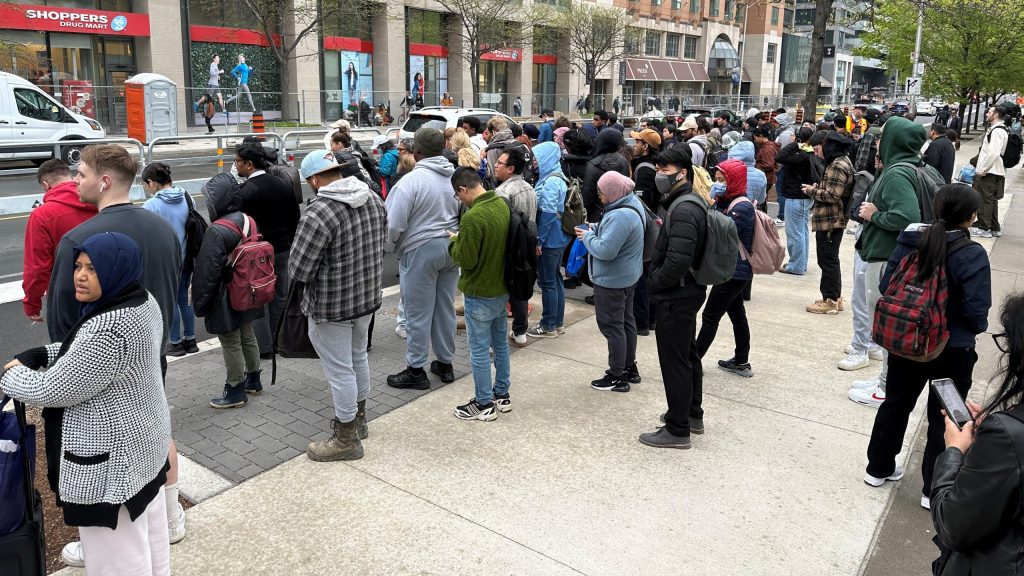Renewed calls for cell service underground amid TTC safety concerns
Posted February 2, 2023 3:53 pm.
Last Updated February 2, 2023 6:03 pm.
As Toronto residents contend with the increase in violent incidents on the TTC over the last few months, experts say underground cellular service could be helpful in making riders feel safer.
Underground cell service is still widely unavailable despite the infrastructure being in place since 2015.
BAI communications won a 20-year, $25 million contract for the exclusive right to build and operate the network on the TTC in 2012, allowing the TTC to offload the upfront capital costs with the hope other cellular networks would buy in.
All 75 subway stations and portions of the tunnel are now equipped with talk, text, and data technology. Still, Freedom Mobile is the only carrier that has agreed to the licensing terms to provide customers with service underground. None of the other major telecommunications companies, including Bell, Rogers and Telus, have signed on to provide service.
Brett Caraway, a professor of Communication, Culture, Information and Technology at the University of Toronto (U of T), said he believes the three major Canadian telecom firms want to be able to control the infrastructure.
“They’re not necessarily fond of making a network-sharing arrangement,” said Caraway. “I think the position of TTC, the City of Toronto and maybe BAI is there’s no reason to have duplication of infrastructure inside the subway system.”
RELATED: Commuter reaction mixed as police boost presence on TTC in wake of violence
In a statement, BAI told CityNews, “We are eager to work with all carriers to provide cellular access to all TTC riders. We appreciate that Freedom Mobile has been our engaged and collaborative partner for several years.”
BAI also added the network is designed to accommodate tunnel service in the future.
“We adhere to TTC’s operational schedule for our expansion plans.”
Director of the Infrastructure Institute at U of T, Matti Siemiatycki, said cell service is standard across many other transit systems.
“It’s just another small reminder of how the system has fallen behind, and true cell phone service now isn’t just a luxury; it’s a necessity, and it makes the experience so much better,” said Siemiatycki.
“This is something that the TTC and all involved should be moving forward on much quicker.”
BAI Communications also built the infrastructure for the New York City subway system, and all four major carriers in the U.S. signed on to provide service.
“This is one of those experiences that reminds us of the importance of not just building the infrastructure but making sure that there’s a business model and a way to connect that infrastructure with the end user,” said Siemiatycki.
“The infrastructure went in with no sense of how the business arrangement was going to function, and now you have a stranded asset,” explained Siemiatycki. “Decisions about transit should be made with the rider first, and the user and the employees, and everything from there should be structured to ensure they get the experience.”
Related:
-
A band-aid solution’: Ford says plan for extra cops on TTC doesn’t go far enough
-
Timeline: Disturbing trend of violent attacks on the TTC
Bell Canada tells CityNews they are committed to building a 5G network in the subway, but the agreement with BAI is exclusive and prevents other carriers from installing their network infrastructure in the subway.
Rogers, the parent company of CityNews, declined to comment on the story, and Telus did not respond to requests from CityNews.
Daniel Tsai, a law professor at Toronto Metropolitan University (TMU), tells CityNews there is neither incentive nor enough competition for the companies to collaborate and sign up.
“What we’re seeing here is a case where public safety is secondary to the big cell networks maintaining their oligopoly because they don’t want to be paying licensing fees to someone else that got there first,” Tsai said.
Caraway added it would be highly inefficient for each telecom company to lay its own infrastructure.
“If you allowed all three of the major companies to lay [it down], then you are not only tripling the number of materials in the subway system, but you’re tripling the number of people that would have to go down and do maintenance,” he said.
“It’s clearly a business decision. There is no incentive, and I think that’s what Torontonians struggled with,” added Siemiatycki.
RELATED: ‘Police do not prevent violence’ — Attacks continue on TTC despite presence of cops, security
The federal government said individual telecommunication companies are responsible for installing infrastructure and said all questions should be directed to the TTC.
Currently, 9-1-1 service is available to all cellular users, but as Siemiatycki admitted, feeling safe underground isn’t just about having access to emergency services.
“You want to be texting a friend or texting a spouse to let them know where you are … Cell phone service is about connection for all sorts of reasons,” he continued.
“It’s a connection to feeling safe; it’s a connection to continue a conversation; it’s a connection for business reasons or recreation and [to] pass the time in spaces in between.”
There has been a reported and disturbing rise in violent attacks involving the TTC, including stabbings, armed robberies and assaults, prompting the city to deploy more security guards, outreach workers and police officers to patrol the vast network.
“The people involved in these situations don’t have that lifeline to the outside world right now because no one is compelling these companies to offer service, and it’s beyond frustrating,” said Caraway.
“It’s infuriating for so many reasons. This is Toronto; this isn’t some small backwoods town somewhere. This is a big city.”
Rogers Communications is the parent company of CityNews.










